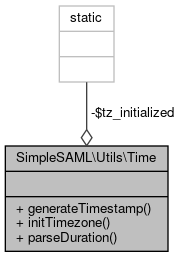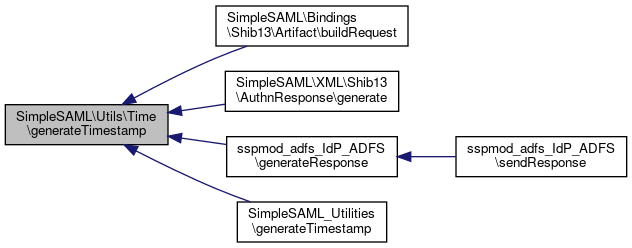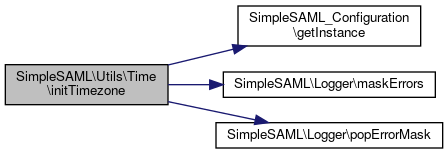 Collaboration diagram for SimpleSAML\Utils\Time:
Collaboration diagram for SimpleSAML\Utils\Time:Static Public Member Functions | |
| static | generateTimestamp ($instant=null) |
| This function generates a timestamp on the form used by the SAML protocols. More... | |
| static | initTimezone () |
| Initialize the timezone. More... | |
| static | parseDuration ($duration, $timestamp=null) |
| Interpret a ISO8601 duration value relative to a given timestamp. More... | |
Static Private Attributes | |
| static | $tz_initialized = false |
Detailed Description
Member Function Documentation
◆ generateTimestamp()
|
static |
This function generates a timestamp on the form used by the SAML protocols.
- Parameters
-
int $instant The time the timestamp should represent. Defaults to current time.
- Returns
- string The timestamp.
Definition at line 32 of file Time.php.
Referenced by SimpleSAML\Bindings\Shib13\Artifact\buildRequest(), SimpleSAML\XML\Shib13\AuthnResponse\generate(), sspmod_adfs_IdP_ADFS\generateResponse(), and SimpleSAML_Utilities\generateTimestamp().
 Here is the caller graph for this function:
Here is the caller graph for this function:◆ initTimezone()
|
static |
Initialize the timezone.
This function should be called before any calls to date().
- Exceptions
-
SimpleSAML_Error_Exception If the timezone set in the configuration is invalid.
- Returns
- void
Definition at line 52 of file Time.php.
References $globalConfig, SimpleSAML_Configuration\getInstance(), SimpleSAML\Logger\maskErrors(), and SimpleSAML\Logger\popErrorMask().
Referenced by SimpleSAML\Logger\FileLoggingHandler\__construct(), and SimpleSAML_Utilities\initTimezone().
 Here is the call graph for this function:
Here is the call graph for this function: Here is the caller graph for this function:
Here is the caller graph for this function:◆ parseDuration()
|
static |
Interpret a ISO8601 duration value relative to a given timestamp.
Please note no fractions are allowed, neither durations specified in the formats PYYYYMMDDThhmmss nor P[YYYY]-[MM]-[DD]T[hh]:[mm]:[ss].
- Parameters
-
string $duration The duration, as a string. int $timestamp The unix timestamp we should apply the duration to. Optional, default to the current time.
- Returns
- int The new timestamp, after the duration is applied.
- Exceptions
-
InvalidArgumentException If $duration is not a valid ISO 8601 duration or if the input parameters do not have the right data types.
Definition at line 92 of file Time.php.
References $timestamp.
Referenced by SimpleSAML_Utilities\parseDuration().
 Here is the caller graph for this function:
Here is the caller graph for this function:Field Documentation
◆ $tz_initialized
|
staticprivate |
The documentation for this class was generated from the following file:
- libs/composer/vendor/simplesamlphp/simplesamlphp/lib/SimpleSAML/Utils/Time.php





